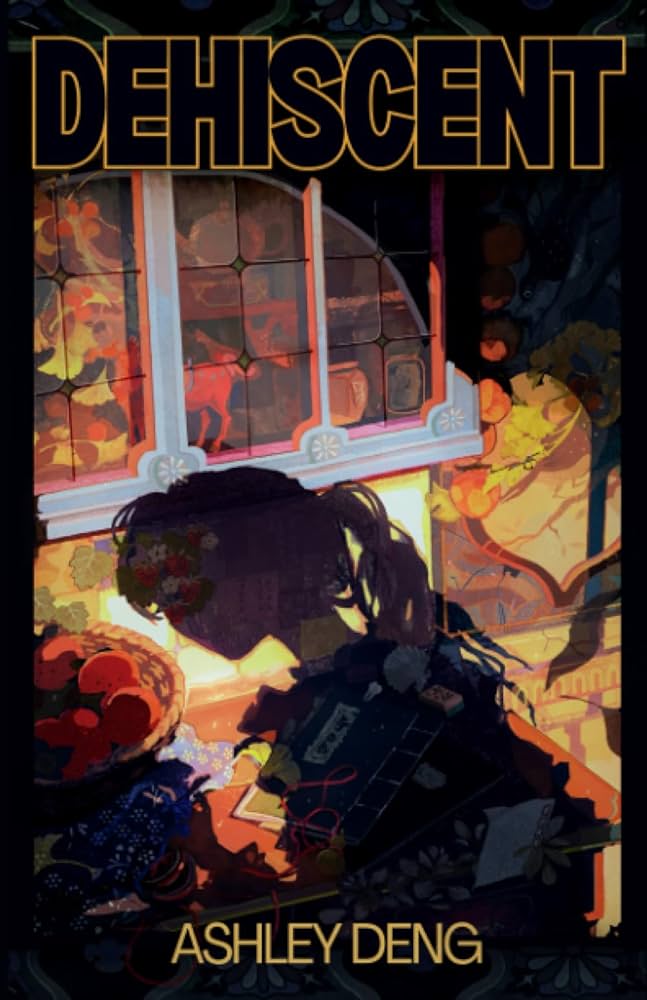It’s a hell of a thing to sit in the lap of luxury while the world burns around you. I’m able to work in the comfort of my home and write this essay for you to read, probably in similar comfort, while half a world away Gaza is burning, and everywhere the sea is rising, the weather is worsening, and fascism is creeping in. This contrast is the central conceit motivating Ashley Deng’s eco-horror novella Dehiscent (the title helpfully defined as an epigraph: when a plant splits open for “distribution, consumption, or regrowth;” also a reopened wound): in a post-collapse China, the Zhu family house sits outside what used to be Shanghai and provides for the family’s every need. Yi, its youngest inhabitant, feels bad about being unable to share their abundance with her classmates. She feels even worse when she stumbles on the secret of the fuel powering the house’s supernatural abundance. Dehiscent is an engaging and painfully timely novella, brief and captivating in its depiction of the anxiety of privilege, although it could have used some additional narrative tension.

The combination of Gothic haunted house and climate catastrophe is an ingenious one, and Deng immediately hammers them both home in the novella’s opening page, the old Zhu family house sitting on stilts over a cliffside, “increasingly familiar with the ocean waves as the years passed, […] the water levels creeping higher and higher up its stilts, stretching to greet it with each kiss of seaspray.” The reader is immediately, and strikingly, reminded of The Haunting of Hill House in this personification and immediate reality of the house, a necessity in a good haunted house story, and it’s one of the places Dehiscent really shines.
The world here is barely and terrifyingly extrapolated from our own: wracked by extreme temperature changes, industrial civilization has collapsed, the air is permanently infused with smog, and everyone is impoverished and hungry, except for the Zhu family, because “the Zhu house provided, as it always had and as it always will.” The specifics of the collapse, generations old by this point, are occluded by time and irrelevance – it doesn’t matter exactly what happened to the reader’s way of life, it just matters that it led to mass death and destruction, devastation so colossal that its beyond the grasp of any singular person as “the world went dry and all the cities flooded.”
Deng’s prose is particularly strong in conveying the cluttered, homey feel of the house, with food-bearing plants sprouting in cabinets and candies and packaged meats tumbling forth to meet every whim of the family. She has a particular knack for lists similarly tumbling forth to convey the coziness of the home:
“There was a couch, worn and sagging, beneath a wall of faded portraits, calligraphy, and photographs depicting the city in its hey-day. A bright pack of soy jutted out of the wall inside a picture frame, in various phases of growth, from sprout to pod. Next to her desk was a cabinet, its doors made of glass and showcasing decades- if not centuries-old antiques; an array of porcelain lacquer plates, teapots, and bowls, arranged amongst the glass specimen jars that took up any empty space not occupied by the branches of ginkgo that occasionally cluttered the cabinet with fallen leaves and stinking, acrid fruit.”
Deng beautifully lays out the combination of material artifacts and organic life that clutter the house, but that last line is the most telling – in a world of want, Yi has so much that she’s sometimes annoyed by the food left to waste. The house provides (“Mangoes beneath the clean bowls, dried scallops falling out of the faucet, fish-still swimming-in their bathtub”) even when the family isn’t in need, while everyone outside the house struggles to find the bare minimum to get by. Yi’s parents and paternal grandparents, the house’s other residents, provide scrap fabric for the community, but spend most of their time playing mahjong while she casts about for ways to share their privilege.
When Yi discovers the price being paid for their abundance, she flounders, and the narrative does similarly, which is the novella’s chief weakness. It could have used a bit more tension outside of her interior struggle – I thought it was going to introduce a conflict with “the facility” that struggles to supply the village outside of the Zhu house. The novella gestures nicely a couple of times at life’s ongoing struggle outside of Yi’s vision, and it could have used more of that and more narrative complexity, which the incredible premise would easily have supported and propelled. I can freely admit that part of this frustration on my part is my personal lack of interest in schoolyard struggles, which is the chief setting of Dehiscent outside of the house as Yi struggles to fit in with her peers.
But, on the other hand, her interior struggle is conveyed extremely well, and maybe the floundering is exactly what allows the reader to sit so perfectly in the anxiety of complicity. Yi’s guilt-fueled anxiety spiral and intrusive thoughts are captured unerringly, as is her dawning understanding of the generations past turning a blind eye to the house’s costs in favor of their own comfort; “Because, she realized, there was no way the others didn’t know. No possible way this house had stayed in her family this long without that secret whispered among its inhabitants over the generations and there was no way she could confront them about it, nothing else she could do but continue being their child.” It isn’t a subtle metaphor, but it’s an apt, necessary, and compelling one.
At the risk of reigniting discourse that is (and should be) dead, it’s possible to read a metacommentary on cozy horror here, in addition to the central metaphor for the global crisis. Horror, as unsettling as it is and should be, is always oozing in from the margins even when one is facing the temptation to focus on their own comfort. For both Yi and the reader, there’s a cost to feeling cozy in a world of horror.

Zachary Gillan
Zachary Gillan is a critic residing in Durham, North Carolina. He blogs infrequently at doomsdayer.wordpress.com and tweets somewhat more frequently at @robop_style. His reviews have appeared in Strange Horizons and Ancillary Review of Books, where he’s also an editor.
